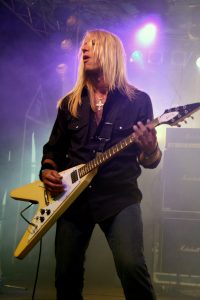Interview: Trouble
Chicago band seeking guitar player and vocalist. Into Judas Priest, UFO, Black Sabbath, heavy metal.
“I think that’s what it said,” recalls Rick Wartell with a sheepish laugh, referring to the advertisement he placed in Illinois Entertainer in the late 1970s, the one that helped his high school band become one of traditional heavy metal’s most beloved torchbearers. Trouble has the distinction of boasting two of the all-time greatest Chicago guitarists, provided they are both mentioned in the same breath (No. 18 in IE‘s April 2008 cover story). Under the dueling twin leads of Wartell and Bruce Franklin, Trouble has maintained heaven and hell in American metal since the two guitarists partnered in 1979. Their group is one of the few everlasting upholders of the Black Sabbath style of meaningful metal, in which cautionary tales, transcendent solos, and crushing gravity juxtapose promised lands with doomsdays. In the early 1980s, when Ozzy Osbourne was performing in an onstage haunted house, Trouble was still haunted by the Vietnam War war pigs (“Bastards Will Pay” from Psalm 9). In the early 1990s, Trouble was taken for a fleeting major-label ride on Rick Rubin’s Def American (now simply American), the label perhaps hoping the act’s “Thinking Of The Past” love-mongering would complement the Black Crowes. In the 2000s, when doom metal meant buzzing through an idolized Sunn amplifier, there was still Trouble, crumbling at the time, but fighting to reclaim the tradition from the avant-garde with a fist-pumping pre-“Immigrant Song” Lucifer’s Friend cover (“Ride The Sky” from 2007’s Simple Mind Condition).
“I was jamming with guys from school at the time, and some guys were not serious, and some guys were thinking about dropping out and doing other things, and I wanted to continue with Trouble,” elaborates Wartell, who now lives in Glen Ellyn but formed the band at Chicago and Western in the Ukrainian Village, according to former Trouble bassist/roadie Ron Holzner. After receiving a call from someone in an Aurora band called Wisecrack, Wartell requested the caller and his bandmate learn a handful of covers and join the Chicagoan for a jam. “And Bruce walked in with his Flying V and Marshall stacks and played a couple songs,” he recounts, “and I was sold. It was like, ‘Gotta have this guy in the band.'”
Wartell doesn’t say much about Eric Wagner, the other member of Wisecrack at the audition. Last month, Trouble’s new studio album arrived in stores, its first without the man who diehards consider The Voice of Trouble (who now sings for The Skull, a Trouble cover band Wagner formed last year with Holzner). Despite lacking the familiar presence, The Distortion Field (FRW) is a triumph for Trouble. After taking a risk on the steeped-in-sleaze Kory Clarke (Warrior Soul) to replace a dejected Wagner in 2008, the band lost the drum tracks on a working version of the record because of a technical glitch, according to press materials. Clarke and Trouble parted ways around that time, with the vocalist telling Blabbermouth last year: “It will be so nice to be working without the shackles that a previous singer has left behind of a band that is over 30 years old and acts and sounds like it.” Trouble quickly secured New Orleans vocalist Kyle Thomas (Exorder), who sang at four Trouble shows in the 1990s, but not until after corresponding with one beyond driven singer.
“Everything was basically recorded at that time, so we just had to send files to Kyle,” Wartell says while clicking through folders, searching for a song title from The Distortion Field. (The guitarist is accustomed to using working titles like “B Groove” for the album’s tracks, the “B” referring to the key of the song.) “But it is a transition. I mean, when you switch vocalists, it’s a setback and it’s time-consuming, and that’s part of the reason this record took so long to produce and get out. Kory had a bunch of stuff written, and we had to start over again. Kyle had to write his own version of everything, with his melodies and his lyrics.” Adding to the challenge of making its first studio record without Wagner (and without Clarke) was the fact that Trouble was (and is, as of press time) without a bassist. “Bruce played 90 percent of the bass on that,” Wartell details, still looking for the song title, “and I played on one song [‘Butterflies’]. It was actually kind of fun.”
And that mystery vocalist – the one who got away?
Reveals the founder: “Phil Anselmo was going to lay vocal tracks on two of the songs for this record . . . but once Kyle joined the band, and Kyle and Phil being such close friends, they kind of laughed about it. Phil was kind of like: ‘Oh, Kyle, you got this. Just nail it.’ Yeah, we decided against it at that point, but who knows? Maybe in the future we’ll do something with Phil.” If The Distortion Field had gone the way Trouble and the former Pantera vocalist were discussing, Anselmo would be singing on the track that became “The Apple From The Snake” (held off the U.S. edition of The Distortion Field for Japanese distribution) and “Your Reflection” (or “B Doom,” as Wartell calls it).
Instead, the gritty Thomas takes complete control of a thick, swampy set that honors doom metal’s old tradition of fighting like hell for peace (“When The Sky Comes Down,” quoting “Bastards Will Pay”). Thomas isn’t out of place, despite sounding nothing like Wagner and not having rehearsed the material with the band before recording with David Treadway in New Orleans. Wartell, Franklin, and drummer Mark Lira recorded the bulk of their tracks at Wartell’s former office in Chicago.
Trouble’s eighth electric full-length was finished – after all that distortion – with a point and a click. Not exactly the technique Black Sabbath used on Paranoid. “It’s, you know, the modern age,” says Wartell, his tone lightening. “Adapt or die.”
Even Sabbath adapts. While working with Rubin on 13, the band reportedly recorded more than 20 songs to yield the eight that made the album’s cut. Rubin told Newsweek that Sabbath simply had to relearn how to write. When Trouble made two records with Rubin, it was more about writing simply.
“His philosophy, when he talked to us, was about simplifying things,” Wartell recalls. “At times with Trouble, we did tend to overcomplicate things, as far as adding like 1,000 different parts to a song that really weren’t necessary . . . I think he really showed us how to put a song together more properly. That ended up working a little bit better for us in the long run. To simplify the sounds, too. A lot of times, when you listen to a Rubin production, you know the drums are more simpler [sic] – they’re loud and natural sounding. And just to get away from a lot of effects. Make it sound more like you’re in the room with the band.”
In the year of our Rubin, Wartell hasn’t heard Kanye West’s Yeezus. He was a month late to 13. What music is on that computer besides The Distortion Field?
“You don’t want to know. It’s just old stuff,” he answers, a little embarrassed. “I’ve been listening to the [Scorpions] In Trance record like nonstop lately. I get hooked on a record, and I’ll just play it over and over again until I’m sick of it. Right now it’s In Trance, and the Uli [Jon Roth] riffs – you can listen to them forever. They’re magical. Before that, I think it was the Force It record by UFO. So yeah, I’m kind of stuck in a time warp.”
The more things change . . .
— Mike Meyer













Glad to see Trouble back my favorite band from Luis in Miami, see you on tour you guys need to come to South FL.